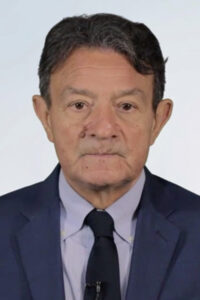
From working to unravel the mysteries of insulin resistance to exploring the beneficial impact of bariatric surgery, and much more in between, Ele Ferrannini, MD, has made seminal contributions to the understanding of the pathogenesis of type 2 diabetes and its related comorbidities.
For his many contributions, Dr. Ferrannini was awarded the 2020 Banting Medal for Scientific Achievement by the ADA. The award recognizes significant, long-term contributions to the understanding, treatment, or prevention of diabetes.
Dr. Ferrannini delivered his Banting Medal award lecture, A Journey in Diabetes, Sunday, June 14, during the Scientific Sessions. The presentation can be viewed by registered meeting attendees at ADA2020.org through September 10, 2020. If you haven’t registered for the Virtual 80th Scientific Sessions, register today to access all of the valuable meeting content.
While discussing the journey that led him to the Banting Medal, Dr. Ferrannini credited his early mentors for inspiring his passion for diabetes research and instilling in him a strong respect for the rigor of scientific method.
“For me, it all started with insulin resistance, which was a very interesting topic when I was starting out as a young investigator. The description, the signs, and the mechanisms of insulin resistance were fascinating topics for pathophysiology, and medicine in general at that time,” Dr. Ferrannini said. “Among my mentors at the time was Dr. Ralph DeFronzo, who taught me the euglycemic clamp technique, which remains the state of the art to measure whole-body insulin resistance. I adopted the technique and began to do a large number of studies.”
In a series of early studies, Dr. Ferrannini and his colleagues confirmed the presence and significance of insulin resistance in various states of glucose intolerance, from impaired glucose intolerance all the way to overt type 2 diabetes. That led to another series of studies looking at interventions that modify insulin resistance, including some pioneering work in exploring the impact of bariatric surgery.
“Among the important lessons we learned from our research in bariatric surgery is that, after bariatric surgery you can retrieve a lot of insulin sensitivity and also ß-cell function,” he said. “That kind of re-taught us the lesson that the game is not over in terms of improving the pathophysiology of diabetes in patients with established, long-term disease.”
Dr. Ferrannini’s journey has produced many other contributions to diabetes research, including groundbreaking work in the associated disorders of insulin resistance, ß-cell function and dysfunction in vivo, the incretin effect, cardiovascular complications of diabetes, and dipeptidyl peptidase-4 and sodium glucose co-transporter 2 inhibition.
But the journey continues for Dr. Ferrannini, who is now Senior Research Associate at the National Research Council Institute of Clinical Physiology and Professor of Medicine at the University of Pisa in Italy. And although there is still much left for him to do, Dr. Ferrannini took time to acknowledge the up-and-coming generations of researchers who will investigate the many questions still unanswered about diabetes.
“The biggest problem that is still out there is obesity, which is the major risk factor for the diabetes tsunami we are witnessing in many parts of the world,” Dr. Ferrannini said. “The journey will not end until we fully implement the new pharmacology to treat diabetes, or until we better learn how to prevent diabetes, not just pharmacologically, but also with lifestyle interventions.”
VIEW THIS PRESENTATION
Already registered?
View this presentation at ADA2020.org
Not yet registered?
Register now to access all presentations from the Virtual 80th Scientific Sessions

